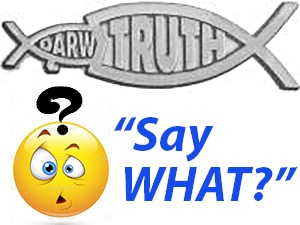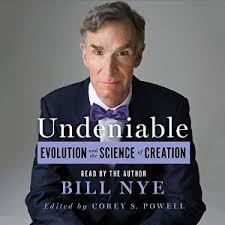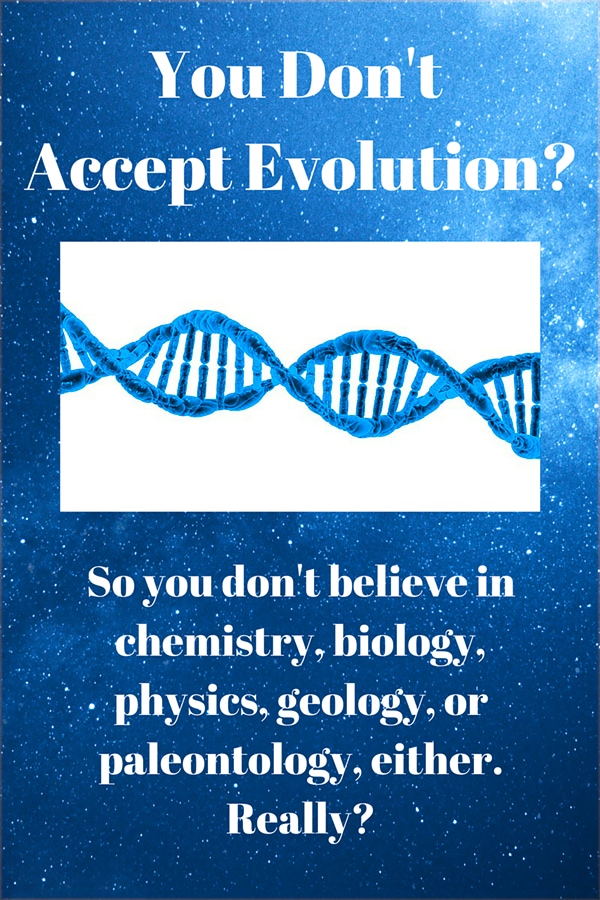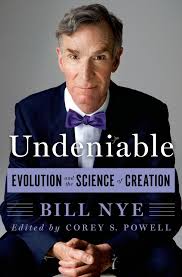 As a science fan and former Christian (now I would describe myself as an agnostic atheist with strong Zen leanings), I am always puzzled by Creationism, that part of Christianity that believes that God created the earth either 6,000 or 10,000 years ago, and that the story of Noah and the Flood is real history, etc. Having grown up Roman Catholic, that was never something I believed in anyway, and never really encountered until moving to Chapel Hill, NC for college and then dental school. Here in the Bible Belt, I was first exposed to those beliefs by people who claimed that God created dinosaur bones as fossils to fool us into thinking ourselves smart. Not only did I find such ideas ludicrous, the theological basis for God fooling us like this as a good thing was equally absurd to me. In simplest terms, I figure that if a deity gave us a mind to think with, what would be the point of creating the universe deliberately to screw with the very understanding of it that he gave us the ability to find? I mean…..really?
As a science fan and former Christian (now I would describe myself as an agnostic atheist with strong Zen leanings), I am always puzzled by Creationism, that part of Christianity that believes that God created the earth either 6,000 or 10,000 years ago, and that the story of Noah and the Flood is real history, etc. Having grown up Roman Catholic, that was never something I believed in anyway, and never really encountered until moving to Chapel Hill, NC for college and then dental school. Here in the Bible Belt, I was first exposed to those beliefs by people who claimed that God created dinosaur bones as fossils to fool us into thinking ourselves smart. Not only did I find such ideas ludicrous, the theological basis for God fooling us like this as a good thing was equally absurd to me. In simplest terms, I figure that if a deity gave us a mind to think with, what would be the point of creating the universe deliberately to screw with the very understanding of it that he gave us the ability to find? I mean…..really?
Over the last 10-15 years, watching the politics of creationism, so-called “Intelligent Design,” and anti-intellectualism grow in the USA, particularly within the far right wing of the Republican Party, now manifest as the Tea Party, I continue to be extraordinarily puzzled by these beliefs. Worse than being puzzled, however, I am frightened by the inroads that people of these beliefs have made into our political system, most especially Congress, as there is now a large group of people in positions of power who actively promote these beliefs, in contradiction to all scientific, rational evidence. They are attempting to force their beliefs into school science classrooms, claim that they’re being “discriminated against,” and who knows what else, when their obvious goal is to introduce fundamentalist Christian beliefs into science, or to discredit science.
 Given that our world is rapidly becoming ever-more-dependent on technology and science, this troubles me greatly. Our future will depend on our children’s ability to distinguish between fantasy, belief, and evidence. I struggle to understand how people can even begin to dispute what has become one of the most successful, foundational scientific theories in the history of mankind, but that is exactly what Creationists do. Fortunately, there are people working to educate the public as to why science is not only legitimate, but the only real way to know our world in a way that will move us forward to a better future. One of those people is Bill Nye, the Science Guy, and he’s recently released a book titled Undeniable: Evolution and the Science of Creation, which I just finished reading.
Given that our world is rapidly becoming ever-more-dependent on technology and science, this troubles me greatly. Our future will depend on our children’s ability to distinguish between fantasy, belief, and evidence. I struggle to understand how people can even begin to dispute what has become one of the most successful, foundational scientific theories in the history of mankind, but that is exactly what Creationists do. Fortunately, there are people working to educate the public as to why science is not only legitimate, but the only real way to know our world in a way that will move us forward to a better future. One of those people is Bill Nye, the Science Guy, and he’s recently released a book titled Undeniable: Evolution and the Science of Creation, which I just finished reading.
Why Read It, Since I Already Believe in Evolution?
This is a natural question, and one worth answering, and there are a couple reasons:
- Most importantly, there is always more to learn. As much as I have previously learned about evolution, there are new discoveries every day by scientists studying the field, and so it fascinates me to see what new discoveries have been made in the fields of genetics, archaeology, paleontology, geology, physics, etc. And before you ask…..yes, evidence for the Theory of Evolution is found in ALL of these scientific fields, not “just” in fossil records.
- As a way to perhaps learn better how to discuss the topic with people whom I know who still have questions or doubts. In this way, I can provide answers rather than doubts, and I also feel more confident in refuting erroneous claims they may make about what is, or is not, or is only partially, known by science.
Overall Impression: Worth Reading for the Basics
In general terms, if you’re already well-versed in the basics of evolutionary theory, you’ll probably be somewhat bored by the book, even if you do learn a number of interesting details and connections, as I did. It is not intended as an in-depth textbook such as could even be used at the high school level, and certainly not at either the college or graduate level, and it does not pretend to be. There is no bibliography with references to journals, textbooks, or any specific research articles, which would be really nice for anyone less familiar with the subject, but who wanted to find out what to read next. Throughout the book, Nye references research constantly, but without endnotes of any kind. I imagine that Creationists will use this fact to attack the book, calling it “unsupported” or something like that, simply because they won’t take the time to go look for themselves, so I feel this is a real failing of the book. If you’re writing a book about science and want to show that the ideas in it are supported, it would behoove Nye to include appropriate references. Don’t give the opponents such an easy target, basically.
 What I liked most about the book is this: Nye pulls together research from a wide range of disciplines, including archaeology, paleontology, genetics, chemistry, cellular biology, physics, and medicine to make his points. This is truly the point that is so often overlooked by Creationists, or anyone wanting to dispute the Theory of Evolution: it’s not just about the fossils! Truly, evidence for evolution is found in ALL of these disciplines, and in fact, if the theory of evolution were not true, then all of medicine would fall apart; we’d have to toss out basic laws of physics; we’d have to pretend that the fossil record doesn’t exist; everything we know about genetics has to be thrown away, and in the end, we’d still be living in the Dark Ages.
What I liked most about the book is this: Nye pulls together research from a wide range of disciplines, including archaeology, paleontology, genetics, chemistry, cellular biology, physics, and medicine to make his points. This is truly the point that is so often overlooked by Creationists, or anyone wanting to dispute the Theory of Evolution: it’s not just about the fossils! Truly, evidence for evolution is found in ALL of these disciplines, and in fact, if the theory of evolution were not true, then all of medicine would fall apart; we’d have to toss out basic laws of physics; we’d have to pretend that the fossil record doesn’t exist; everything we know about genetics has to be thrown away, and in the end, we’d still be living in the Dark Ages.
Nope, We Don’t Know Everything Yet
This is one of the most obvious arguments made by Creationists, as if a lack of perfect knowledge invalidates the knowledge that we do have – especially when the knowledge that we do have is used in almost every part of our life today, even though you don’t really see it. Of course, the argument about “transitional fossils” is part of that, but Nye covers this issue quite well, and the simple fact is – there ARE a lot of transitional fossils. If you don’t think there are, it just means you haven’t looked, or you don’t really understand what the term means. But the lack of knowledge is exactly what makes this exploration so exciting, because the more questions we ask, and the more experiments and searching we do, the more answers we find, whether in the lab or out in the field. But overall, Nye does a pretty good job of covering the ground that we don’t know yet, and even discussing some of the efforts under way to learn. But given the progress that humanity has made in understanding evolution since Darwin (only 155 years ago!), whatever would make you think that we won’t understand at least that much more in another 160 years? Heck, just look at how far we’ve come in the last 100 years, or 50 years, or 25 years!
An Excellent Primer on Evolution
To conclude, I would strongly recommend this book to any of the following groups:
- Anyone with questions about the foundational concepts of evolution
- Anyone who doubts evolution but keeps an open mind
- Anyone who wants an easy-to-understand primer that pulls together the strands of support from multiple disciplines
- Anyone who is debating evolution with creationists who actually have an open mind and needs an easy reference
This book is NOT for anyone with a desire to dig deeper into the scientific literature and get specifics on any topic. As I said, I think the complete lack of bibliography, footnotes, citations, etc is a serious weakness.
In summary, I enjoyed the book, but will probably not keep it as a permanent part of my personal library.
Upcoming Book Reviews (yes, I’ve been reading a lot recently):
- Waking Up: A Guide to Spirituality Without Religion by Sam Harris
- Sky Crystals: Unraveling the Mysteries of Snowflakes by Don Kamarechka (only about a year overdue!)
- Physics of the Future by Michio Kaku
